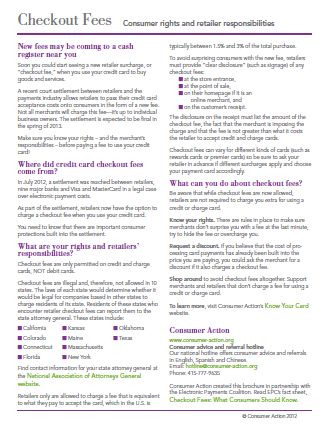Keep the Information Flowing
Small contributions go a long way. Your donation to Consumer Action, a 501 (c)(3) nonprofit, nonpartisan organization, can help us cover the cost of research, writing, and translation of our materials. To keep our services free for those who need them. Select an amount to give.
Published: December 13, 2012
Credit card checkout fees
Consumer rights and retailer responsibilities

Publication Series
- This publication is not currently associated with any training series.
Download File
Credit card checkout fees
File Name: checkout_fees.pdf
File Size: 0.07MB
Languages Available
Table of Contents
New fees may be coming to a cash register near you
Soon you could start seeing a new retailer surcharge, or “checkout fee,” when you use your credit card to buy goods and services.
A recent court settlement between retailers and the payments industry allows retailers to pass their credit card acceptance costs onto consumers in the form of a new fee. Not all merchants will charge this fee—it’s up to individual business owners. The settlement is expected to be final in the spring of 2013.
Make sure you know your rights – and the merchant’s responsibilities – before paying a fee to use your credit card!
Where did credit card checkout fees come from?
In July 2012, a settlement was reached between retailers, nine major banks and Visa and MasterCard in a legal case over electronic payment costs.
As part of the settlement, retailers now have the option to charge a checkout fee when you use your credit card.
You need to know that there are important consumer protections built into the settlement.
What are your rights and retailers’ responsibilities?
- Checkout fees are only permitted on credit and charge cards, NOT debit cards.
- Checkout fees are illegal and, therefore, not allowed in 10 states. The laws of each state would determine whether it would be legal for companies based in other states to charge residents of its state. Residents of these states who encounter retailer checkout fees can report them to the state attorney general. These states include:
- California
- Colorado
- Connecticut
- Florida
- Kansas
- Maine
- Massachusetts
- New York
- Oklahoma
- Texas
Find contact information for your state attorney general at the National Association of Attorneys General website.
- Retailers only are allowed to charge a fee that is equivalent to what they pay to accept the card, which in the U.S. is typically between 1.5% and 3% of the total purchase, although a maximum fee of 4% is permitted.
- To avoid surprising consumers with the new fee, retailers must provide “clear disclosure” (such as signage) of any checkout fees:
- at the store entrance,
- at the point of sale, offline and online
- on customer receipts.
- The disclosure on the receipt must list the amount of the checkout fee, the fact that the merchant is imposing the charge and that the fee is not greater than what it costs the retailer to accept credit and charge cards.
- Checkout fees can vary for different kinds of cards (such as rewards cards or premier cards) so be sure to ask your retailer in advance if different surcharges apply and choose your payment card accordingly.
What can you do about checkout fees?
Be aware that while checkout fees are now allowed, retailers are not required to charge you extra for using a credit or charge card.
- Know your rights. There are rules in place to make sure merchants don’t surprise you with a fee at the last minute, try to hide the fee or overcharge you.
- Request a discount. If you believe that the cost of processing card payments has already been built into the price you are paying, you could ask the merchant for a discount if it also charges a checkout fee.
- Shop around to avoid checkout fees altogether. Support merchants and retailers that don’t charge a fee for using a credit or charge card.
To learn more, visit Consumer Action’s Know Your Card website.
Credit: Consumer Action created this brochure in partnership with the Electronic Payments Coalition. Read EPC’s fact sheet, Checkout Fees: What Consumers Should Know.
Download File
Credit card checkout fees
File Name: checkout_fees.pdf
File Size: 0.07MB
For More Information
None Available
Sponsors
Notes
Filed Under
Consumer Rights ♦ Credit Cards ♦
Copyright
© 2012 Consumer Action. Rights Reserved.
Quick Menu
Support Consumer Action

Join Our Email List
Consumer Help Desk
- Help Desk
- Submit Your Complaints
- Presente su queja
- Frequently Asked Questions
- Links to Consumer Resources
- Consumer Service Guide (CSG)
- Alerts
- Consumer Booknotes
